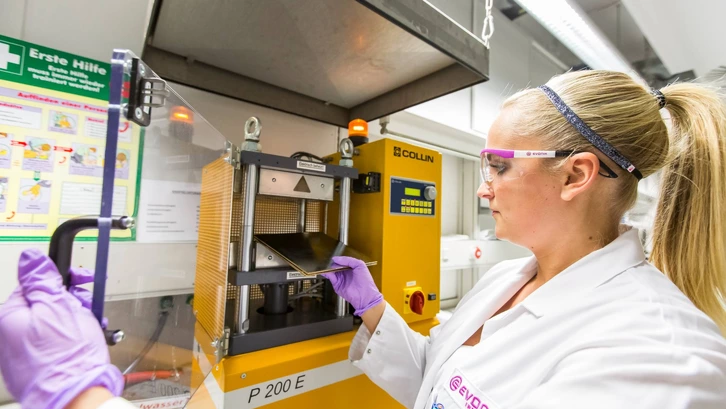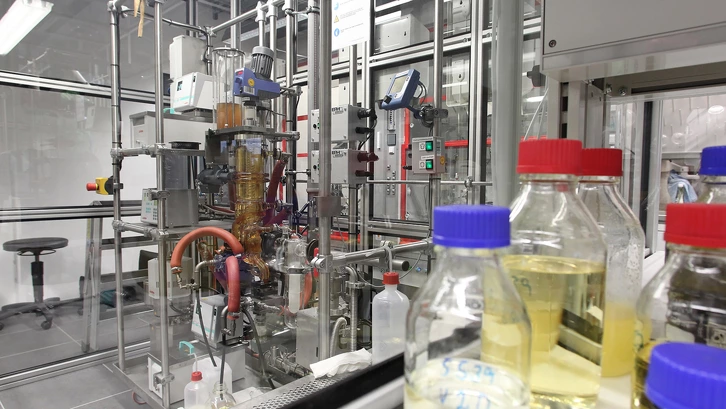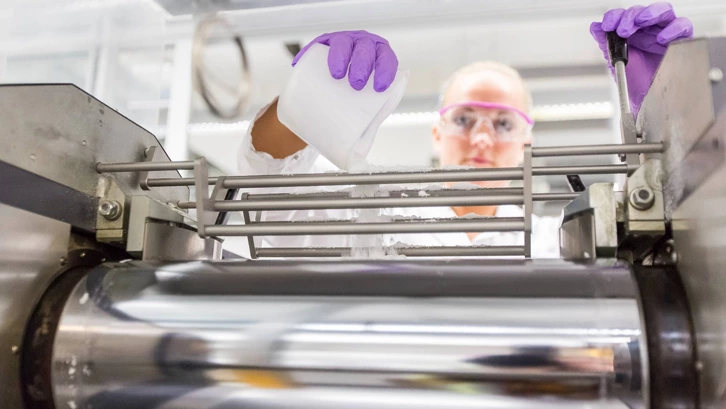
C4-Innovation: Pioneering Process & Product Development
C4 innovation means sustainable progress: We optimize our processes, develop new products and support our customers with technical expertise.
BENEFIT FROM OUR STRONG TECHNOLOGY POSITION
We use products from refineries to produce monomers, fuel components, oxo alcohols and plasticizers in large quantities. We also manufacture a range of other products for special applications. The C4 Verbund’s production enables us to create sustainable, almost 100 percent value from our raw materials.
To further increase the efficiency and sustainability of the C4 process chain, around 70 experts constantly advance the development of our processes and products.
As the industry leader in this field, we achieve around two-thirds of our current product sales as a result of our own developments. We protect our technologies with more than 300 worldwide patents and patent applications. About 30-40 new registrations are added every year.
INNOVATION DRIVES THE FUTURE OF C4 CHEMISTRY

Our innovation team consists of experts from the fields of chemistry, engineering, nanotechnology and simulation. Interdisciplinary teams work to find the best solution for you, our customers.
STATE-OF-THE-ART APPLICATION LABORATORY FOR PLASTICIZERS
In our state-of-the-art application laboratory, our experts develop new plasticizers and test them in various applications. For this purpose, our employees use standard formulations or, on request, also test directly in the customer formulations.
In order to provide our customers with the best possible support, we carry out a wide range of common test methods for flexible PVC in our application laboratory. For special requirements, we also offer methods based on state-of-the-art technologies in cooperation with Evonik Analytics. With our know-how and our modern analysis and testing methods, we thus support numerous customer projects. We optimize formulations and production processes as well as investigate the causes of defects such as bubbles, discoloration, surface defects or deformation in the end product.



OPEN INNOVATION
In the spirit of "Open Innovation", Evonik maintains a large number of cooperations with universities and scientific institutes, to ensure the rapid transfer to the company of cutting-edge research findings related to sustainable aspects of chemistry, biology and physics.
One example of this is the MACBETH project.
MACBETH

NOW IT'S GETTING BIG - NOVEL MEMBRANE REACTOR SOON TO BE ON AN INDUSTRIAL SCALE
Evonik is further expanding its position as one of the leading companies in the field of C4 chemistry. 2020 saw the launch of the largest EU-funded project ever to be coordinated by Evonik: MACBETH (Membranes And Catalysts Beyond Economic and Technological Hurdles). The goal is to develop a new process for catalytic synthesis, with corresponding separation equipment in a single, highly efficient catalytic membrane reactor (CMR). MACBETH is the follow-up project to the ROMEO project, which was completed in September 2019 (Reactor Optimization by Membrane Enhanced Operation).
The MACBETH consortium consists of 24 partners from ten different countries. It is a network of all competences from catalysis, membranes, carriers, reactors, engineering, modeling, through to the perspective of the end user.
"The decisive factor here is that we think together beyond the boundaries of chemistry, share knowledge and leverage synergies. An individual company would not be able to do this. Our consortium brings together expertise that will make the desired breakthrough in catalytic synthesis possible in the first place," says Dr. Marc Oliver Kristen, head of the Innovation Agency at Evonik and MACBETH project manager.
In individual sub-projects, the concept of the new reactor is now being transferred and implemented to various chemical reactions. These include hydroformylation for specialty chemicals, hydrogen generation for the transport/electricity generation sector, propane dehydrogenation (PDH) for large-volume chemicals, and bio-catalytic oil cracking for biotechnologically manufactured products.
Evonik's focus in the project is on the hydroformylation reaction. In this catalysis, which is traditionally carried out homogeneously, olefins are reacted with synthesis gas to form aldehydes.
Sustainability is a key driver here: Thus, the targeted reduction in greenhouse gas emissions for large-volume industrial processes will be up to 35 percent and the increase in resource and energy efficiency up to 70 percent.
In addition, the new reactor design not only guarantees significantly smaller and even safer production plants; it also helps to consolidate the company's leading position in the market, as in future, plants of this type will be able to reduce investment costs (CAPEX) by up to 50 percent and operating costs (OPEX) by up to 80 percent.
Learn everything about the MACBETH project in a nutshell or visit the official MACBETH project website.
Here you can find news about MACBETH.



